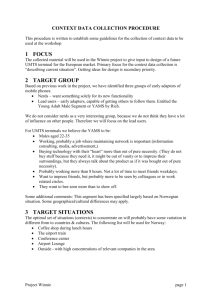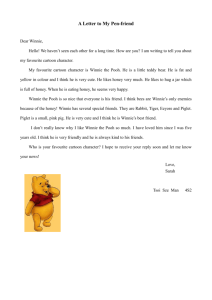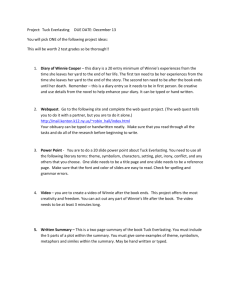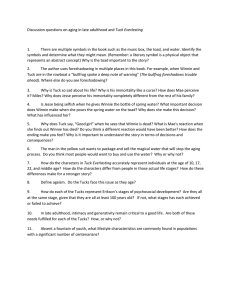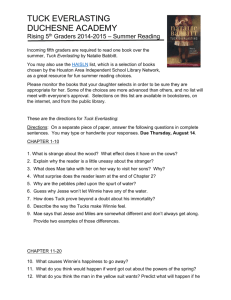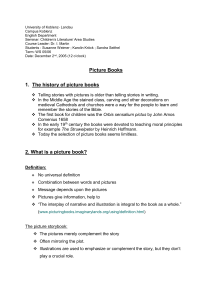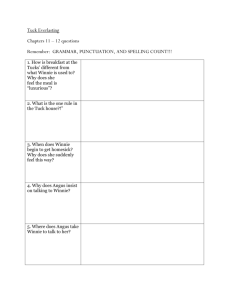Violent and Isolating Potentials of Familial Relationships Happy Days In
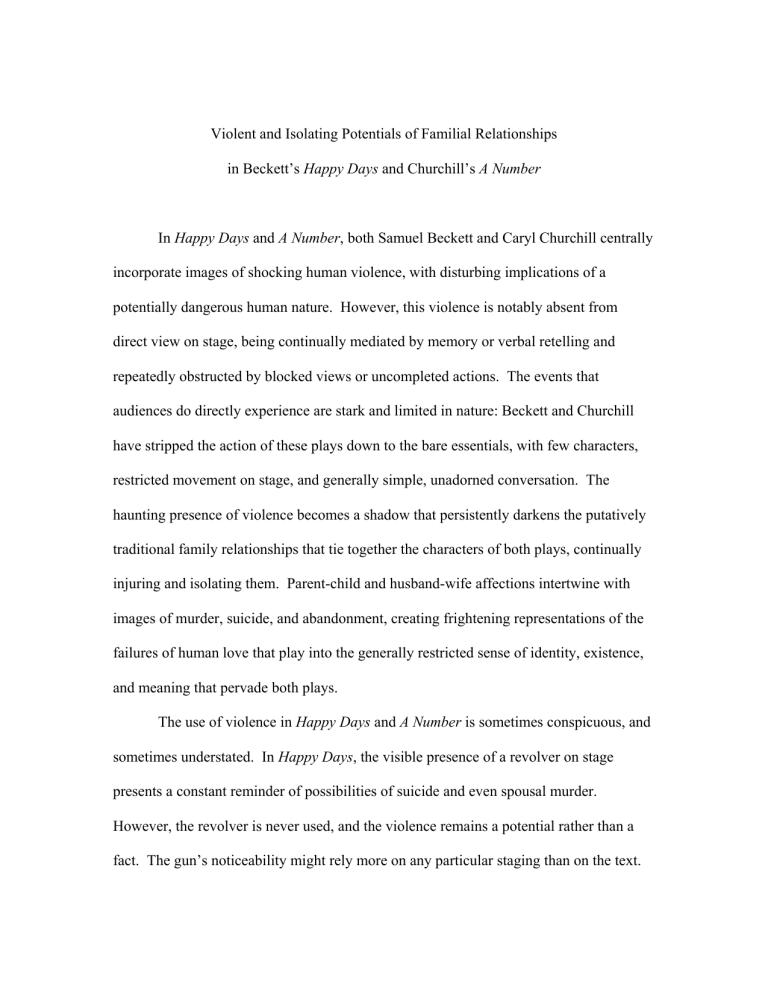
Violent and Isolating Potentials of Familial Relationships in Beckett’s Happy Days and Churchill’s A Number
In and A Number , both Samuel Beckett and Caryl Churchill centrally incorporate images of shocking human violence, with disturbing implications of a potentially dangerous human nature. However, this violence is notably absent from direct view on stage, being continually mediated by memory or verbal retelling and repeatedly obstructed by blocked views or uncompleted actions. The events that audiences do directly experience are stark and limited in nature: Beckett and Churchill have stripped the action of these plays down to the bare essentials, with few characters, restricted movement on stage, and generally simple, unadorned conversation. The haunting presence of violence becomes a shadow that persistently darkens the putatively traditional family relationships that tie together the characters of both plays, continually injuring and isolating them. Parent-child and husband-wife affections intertwine with images of murder, suicide, and abandonment, creating frightening representations of the failures of human love that play into the generally restricted sense of identity, existence, and meaning that pervade both plays.
The use of violence in Happy Days and A Number is sometimes conspicuous, and sometimes understated. In Happy Days , the visible presence of a revolver on stage presents a constant reminder of possibilities of suicide and even spousal murder.
However, the revolver is never used, and the violence remains a potential rather than a fact. The gun’s noticeability might rely more on any particular staging than on the text.
In A Number , Churchill weaves in horrific stories of murder, suicide, and parental neglect. Yet on stage, we see only a series of simple conversations, and the bloody events become back-stories rather than performed actions. Beckett does occasionally use forms of violence as at least partially visible spectacle in Happy Days , such as when
Winnie breaks a glass bottle over Willie’s head, when she “strikes down at him” with the beak of her parasol, or when that parasol catches suddenly and magnificently on fire (12).
However, when Winnie “strikes” at Willie, he is hidden from view, so that the audience cannot see whether she makes contact. The crash of the bottle is similarly unseen, though we do witness the subsequent blood that trickles down Willie’s bald head. The burning parasol, though spectacularly visible and potentially dangerous, never does either character any harm. Similarly, the horrifying intensity of B1’s murder of B2 might be considered a sort of spectacle in A Number , but in addition to mediating the story of the killing via B1’s retelling, Churchill also deprives her audience of all the grisly details, as
B1 refuses to explain how or where the death occurred. Gruesome possibilities are central to the plot of both Happy Days and A Number , but they are also continually obscured.
Indeed, characters in both plays disregard such violence with a noted nonchalance. Willie and Winnie never react to her breaking a bottle over his head, as though it were a commonplace occurrence. Winnie’s revolver is thrown right in with her bag of toiletries, as though the comfort it provides her is equivalent to the reassurance she derives from being able to regularly brush her teeth and fix her hair. Salter is unable to recall much of his neglect of B1, and he even compares those two years to “one long night out,” as though such child abuse were equivalent in value to any forgotten evening
at a bar (52). Similarly, Salter hardly reacts to the murder of B2, saying that “it wasn’t so bad as you’d think because it seemed fair. I was back with the first one” (61). This kind of reaction in both plays is surreal, and although both the harmful events and the subsequent indifference are more exaggerated in A Number , both Beckett and Churchill exhibit a kind of casual expectation of destructive human actions that carries disturbing implications about their potential normality to human nature.
Indeed, hurtful human responses pervade Happy Days and A Number on a variety of less readily apparent levels as well. The more prominent forms of violence in both plays might be emotional rather than physical. Beckett and Churchill continually highlight an extensive fear of human abandonment in their characters that might typify the mode of emotional violence that the characters dread most. Both B1 and Salter repeatedly remind the audience of the horrifying image of B1 abandoned and cowering under a bed, screaming for his father alone. Feelings of guilt, helplessness, and disgust attached to such scenes prompt Salter to eventually give up B1 altogether, while the remaining traumatic memory of such moments partly motivates B1’s jealous murder of
B2, and likely his suicide as well. As an adult, B1 still grills his father to determine whether he was present for those moments under the bed, saying,
I want to know if you could hear me or not because I never knew were you hearing me and not coming or could you not hear me and if I shouted loud enough you’d come… or maybe there was no one there at all and you’d gone out so no matter how hard I shouted there would be no one there.” (32)
Similarly terrified of being left alone, Winnie expresses a strikingly parallel desire to be heard and responded to:
If only I could bear to be alone, I mean prattle away with not a soul to hear. ( Pause .) Not that I flatter myself you hear much, no
Willie, God forbid. ( Pause .) Days perhaps when you hear nothing. ( Pause .) But days too when you answer. ( Pause .) So that I may say at all times, even when you do not answer and perhaps hear nothing, Something of this is being heard, I am not merely talking to myself, that is in the wilderness, a thing I could never bear to do – for any length of time. ( Pause .) That is what enables me to go on, go on talking that is. ( Pause .) Whereas if you were to die… or go away and leave me, then what would I do, what could I do? (21)
Like B1, Winnie is not only terrified of being alone, but is particularly afraid of speaking unheard, without the possibility of any response. The fear is central, and both characters continually draw the audience’s attention to these possibilities of unobserved abandonment. In act two, B1 asks Salter eight different times whether he might have heard the shouting, or whether he would have heard, had the yells been louder. Similarly,
Winnie repeatedly tests whether Willie can hear her at various volumes, constantly desiring his reassurance that he can in fact listen to her:
Winnie: I beseech you, Willie, just yes or no, can you hear me, just yes or nothing.
Pause
Willie: Yes.
.
Winnie: ( turning front, same voice ). And now?
Willie: ( irritated ). Yes.
Winnie: ( less loud ). And now?
Willie: ( more irritated ). Yes. (26)
The way that Winnie thus demands Willie’s response despite his obvious irritation is emblematic of the intensity of her need for his presence, observation, and acknowledgment. Both Winnie and B1 fear unnoticed abandonment above all else.
In , the conspicuous absence of Salter’s wife and the Bernards’ mother further extends the consequences of this kind of abandonment. As though to underscore the violence of her demise, this mother’s death is repeatedly rehashed, first as a death in childbirth, then in a car accident, and finally, most violently, as a suicide flattened under
a train. B1 associates her absence with the same kind of neglectful abandonment as
Salter’s abusive parenting when he says that “I remember her sitting there, she was there… she’d be there but she wouldn’t help stop anything” (32). Both dead and alive, this mother apparently ignores B1’s shouts. Moreover, considering that she took her own life, her death does not absolve her from responsibility for B1’s subsequent abuse and abandonment. A Number thus paints an eminently disturbing picture of family life, imbued with repeated suicide and neglect as well as fratricide and indifference.
The negative implications regarding family life in Happy Days are more subtle, but in many ways they are similarly negative. Like Salter’s wife, Winnie too considers killing herself, and her primary discontent might be her husband Willie’s irritated disconnection from her. Indeed, just as Willie generally ignores Winnie, so did Salter apparently take little notice of his wife’s troubles: when she killed herself, as he says, “I was still with her more or less but not with her then no I was having a drink I think” (41).
He cannot even remember precisely where he was. Winnie’s partial entombment and
Willie’s apparent inability to move otherwise than on all fours could be viewed as symbolic of the limitations that people impose on each other, in marriage and otherwise, as though such marital relationships serve to isolate people rather than to provide companionship. In any case, the entrapment created by both situations only adds to the way that Willie and Winnie are cut off from each other, creating a sort of violent absence that both experience for the other. Though Willie can move, he apparently cannot move so well as to be able to climb Winnie’s mound and make any physical contact with her.
Regardless of whether he attempts to climb the hill to shoot her and end her irritating twaddle, or whether he seeks to embrace and kiss her, Willie is apparently irrevocably cut
off from his wife, just as Salter eventually becomes permanently separated from his wife as well as both Bernards.
The violence of this kind of separation might be exemplified by Winnie’s frightening description of Mildred’s ordeal where she encounters a mouse alone, cut off from human defenses. Mildred’s identity is not clear: she might be a relation, an acquaintance, or even a fictional character, and the nature of Mildred’s experience might seem silly or unimportant, viewed as a mere accidental meeting with a mouse. However,
Winnie’s telling makes the story terrifying:
Suddenly a mouse ran up her little thigh and Mildred, dropping
Dolly in her fright, began to scream – ( WINNIE gives a sudden piercing scream ) – and screamed and screamed – ( WINNIE screams twice ) – screamed and screamed and screamed and screamed till all came running, in their night attire, papa, mamma,
Bibby and… old Annie, to see what was the matter… ( pause )… what on earth could possibly be the matter. ( Pause .) Too late.
( Pause .) Too late. (59)
The real horror here might be not the encounter with the mouse so much as that Mildred’s parents don’t arrive in time. What happens precisely is unclear, but Winnie makes it clear that the screams are real by emulating them herself, and the image of Mildred crying alone recalls A Number ’s numerous descriptions of B1’s unnoticed shouting. As
Winnie notes earlier, the event even takes place under a table, much like B1 hides under a bed (55). When Michael Black describes his imagined people living in excavated caverns underground, he fully unites these views of destruction and isolation. In this vision, human separation literally kills, as Michael describes that “sometimes they walled people up alive in there, it’s possible because of how the remains were contorted” (57).
When these buried individuals scream for their lives, they are utterly and irrevocably alone, more so than Winnie, Mildred, or B1 ever are. Moreover, the attached sense of
entrapment ties not only to Winnie’s partial burial, but also to the feelings of powerlessness experienced by Winnie as well as B1, B2, and Mildred.
These persistent trends of obscured violence and familial neglect and isolation are connected in the sense that both radically rupture the traditional family structures and associated personal identities that might otherwise comprise the characters of Happy
Days and A Number . The husband-wife relationships of both plays are divided by the absence of one or both figures. Winnie is generally unable to see or communicate with
Willie, and their interactions are often aggressively forceful, involving guns and broken bottles. Salter neglects his wife, who is then separated from him irrevocably by death.
Winnie’s fear in the second act that Willie might be dead underscores a sense on her part of the total disconnection and isolation that this would involve. Parent-child relationships become similarly ruptured in both plays, as the audience repeatedly receives descriptions of B1 and Mildred screaming for their parents without response or aid. Moreover, conventional notions of family roles are further disturbed by Willie and Winnie’s apparent physically disconnected childlessness as well as by Salter’s abusive singlefatherhood.
Furthermore, and A Number involve a broad sense of human limitation and disorganization that is related to this violence, isolation, and traditional family rupture. The simplicity of staging, plot, and cast of both plays serves to emphasize human characterization, among other elements. Such an aim for simplicity might explain both plays’ avoidance of overt violent spectacle. However, the sense of consciousness that results in both plays is highly disorganized, with characters repeatedly unable to communicate with each other, remember past events, or speak without losing
their trails of thought. Here the plays do differ in their implications. In Happy Days ,
Winnie’s mental disorganization likely results partly from her lonely spousal disconnection from Willie as well as other human contact, and partly from her physical entrapment and isolation, but it also relates to her simple advancing age. In A Number ,
Salter, B1, and B2’s confusion and occasional desperation relate to the extensive personal violence and familial trauma they have experienced, but they also relate to broader questions of personal and physical identity that the play addresses on levels beyond family and personal relationships, involving larger societies and genetic makeups as well.
The violence and disorganization of family, memory, and personality in Happy Days might address the status of human meaning, while A Number focuses more on the status of identity. Watching A Number , the audience might be led down paths involving cloning and human individuality. Seeing Happy Days , one might be more inclined to respond like Mr. Shower (or Cooker): “What does it mean? he says – What’s it meant to mean?” (43). However, both questions, involving individuality and commonality, meaning and rupture, relate to the violent implications and undertones of both plays. The isolation examined by Beckett and Churchill has weighty ramifications for all of human existence, whether viewed through lenses of identity or value, whether it comprises B1’s violence or another of Winnie’s happy days.
Beckett, Samuel. Happy Days . New York: Grove Press, 1989.
Churchill, Caryl. A Number . New York: Theatre Communications Group, 2002.
